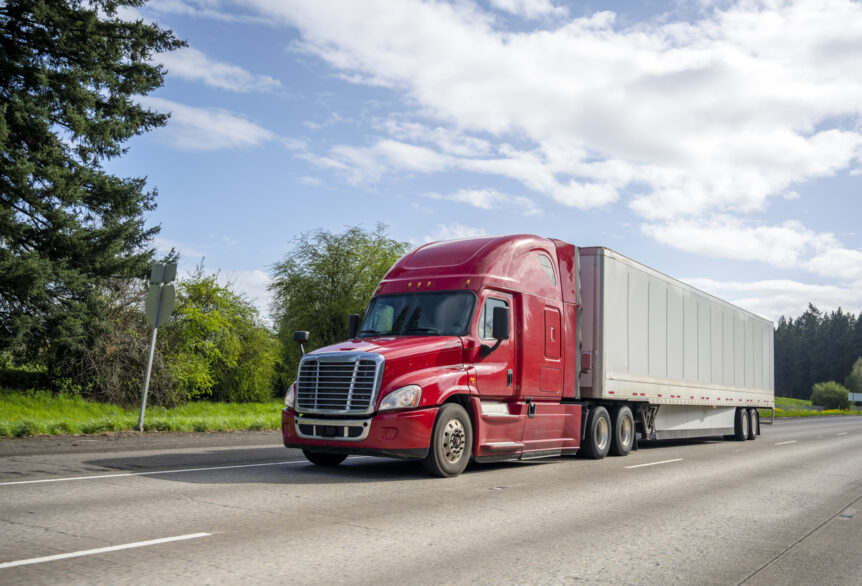Interstate vs. Intrastate Trucking

Trucking plays a vital role in Denver’s economy, moving goods across the city and beyond. However, not all trucking operations follow the same rules. Interstate trucking activities are subject to stricter federal laws and regulations imposed by multiple states. On the other hand, intrastate trucking primarily involves Colorado rules.
Interstate trucking involves transporting goods across state lines, while intrastate commerce occurs within Colorado’s borders. Each type falls under different regulatory frameworks, which impact driver qualifications, vehicle maintenance, and liability in accidents. Let’s unpack the differences between interstate vs. intrastate trucking and how they may affect you. If you were injured in a truck accident, reach out to us today.
What Is Intrastate Trucking?
Intrastate trucking in Colorado involves transporting goods or passengers within the state’s borders. A delivery truck operating solely in Denver or between the Mile High City and Colorado Springs falls under this category. A bus is another common type of commercial intrastate vehicle.
While bus accidents may be less common and sometimes less severe than those involving semi-trucks, they can still result in serious injuries, such as traumatic brain injuries. Additionally, buses are subject to many of the same regulations as commercial intrastate trucks.
Here are some factors that you need to know:
- State regulations
- CDL requirements
- Insurance standards
- Local compliance roles
If a company only works in Colorado, they are based within the state. This means it will be easier to address any disputes with that company, such as an accident claim.
Unfortunately, intrastate trucking accident cases are still pretty complicated, as they may involve the driver, the company that hired them, the truck manufacturer, and even the maintenance company.
What Is Interstate Trucking?
Interstate trucking refers to any commercial road-based activity that crosses state lines. For example, a truck traveling from Denver to Wyoming may be considered interstate commerce.
Some important aspects of interstate trucking are:
- Federal oversight
- Licensing requirements
- Insurance mandates (i.e., higher minimum coverage requirements)
- Hours of service limitations
Interstate trucking accidents often involve complex federal regulations. For instance, a personal injury attorney would need to verify that a driver was within the hours of service limitations when litigating a commercial truck accident claim. If they were not, it could be relevant for the case.
Key Differences
The primary distinction between interstate and intrastate trucking lies in regulatory authority. Interstate operations fall under federal jurisdiction, although trucks and drivers must still follow the laws of each state they travel through.
Conversely, intrastate trucking companies do not have to be as mindful of other jurisdictions’ traffic laws.
Impact on Accident Claims
Both interstate and intrastate trucking accidents can lead to catastrophic injuries. However, the type of commerce a driver engages in will impact how the claim is handled.
The type of trucking affects legal claims in the following ways:
- Interstate accidents may involve multiple jurisdictions
- Both cases can involve multiple parties, although the number of entities involved will likely be higher in interstate claims
- Federal regulations require drivers to keep detailed logs, which can provide valuable evidence in accident claims
The good news is that all commercial vehicles are heavily regulated, and relevant traffic laws are strictly enforced in Colorado. The goal is to promote safety for everyone on the road while holding negligent parties accountable for their careless or dangerous behavior.
Contact Our Truck Accident Attorneys at Zaner Law Personal Injury Lawyers at (720) 613 9706
With the right preparation and a common-sense approach to hiking, there’s no reason you can’t stay safe and have a fun and memorable experience amid the natural beauty Colorado is known for.
If you suffer an injury along the way because of the negligent or malicious behavior of others, a qualified attorney can help you understand your legal options.
For more information, please contact the Denver personal injury lawyers at Zaner Law Personal Injury Lawyers to schedule a free initial consultation with a personal injury lawyer.
We are located in Denver, CO, and proudly serve all of Denver County.
Zaner Law Personal Injury Lawyers
1610 Wynkoop Street, Suite 120.
Denver, CO 80202
(720) 613 9706
Find us with our Geocoordinates: 39.75208145814397, -105.00017355026108
About The Author

Kurt Zaner has earned national recognition for his innovative legal strategies, securing some of the largest verdicts in Colorado. He assists injured clients in Denver with personal injury cases, including car accidents, truck accidents, wrongful death, motorcycle accidents, and more. Click here to view some of the fantastic case results that Zaner Law has successfully handled.
Location: Denver, CO


